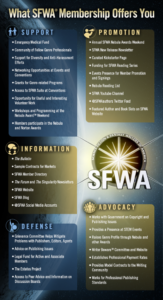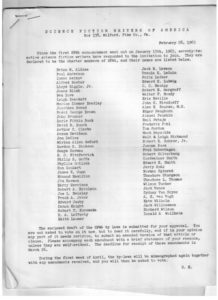 The Nebulas this year were an amazing, dazzling, staggering blur, and an overall splendid time. (I got a selfie with William Gibson plus shared french fries with an astronaut!). But there was one sad thing for me, which was that in all the shuffle and mistimings, I didn’t get a chance to deliver the speech I’d prepared.
The Nebulas this year were an amazing, dazzling, staggering blur, and an overall splendid time. (I got a selfie with William Gibson plus shared french fries with an astronaut!). But there was one sad thing for me, which was that in all the shuffle and mistimings, I didn’t get a chance to deliver the speech I’d prepared.
I’ve been spending some time post-Nebulas thinking and reflecting on everything I’ve learned from the SFWA Presidency, and all the valuable things I’ve discovered and learned as a result of my time in office. Over the next few weeks, I’ll publish the blog posts I have been putting together, one dedicated to each year, and then a final recap. It seemed a logical thing to kick that series off by sharing that speech, which contains a number of things I wanted to say to the SFWA family at large. I hope this serves.
Six Nebulas ago, Steven Gould approached me. He needed someone who’d be willing to run for Vice President the following year, picking up a one year term as SFWA made the transition to staggering the terms of the Vice President and President. He promised me it would be only a one year obligation. Insert hollow laugh here.
July 1st will mark a big transition in my life: after five years on the SFWA board, spending one year as Vice President under Steven Gould, and then two terms as President. I have spent more time on the SFWA board than most people do getting their college degree, and that is an odd thought. General wisdom is that the SFWA Presidency eats a book a year; I have definitely found that true, and I suspect a large number of stories got consumed as well. I am looking forward to becoming actually productive again.
But there have been a multitude of compensations. A wealth of friendships. An abundance of moments that delighted my heart or that felt like tremendous victories. There is a tendency to label SFWA governance toxic, to imply that it destroys the soul and hollows one out. I am pleased to report that this is not actually the case, that I have found it, on the whole, a community that is welcoming and well-intentioned, though not always graceful in expressing it. I step down feeling the better for the five years in which I have learned and grown.
I have presided over both the first and the second all-female President/Vice President teams in SFWA history, the first time M.C.A. Hogarth and myself, the second time Erin Hartshorn and myself. I had thought that perhaps now handing the Presidency over to Mary Robinette Kowal represented another historic first, only to find this was not so. The first female to female SFWA Presidency exchange actually took place in 2003, when Sharon Lee handed the reins over to Catherine Asaro. I’m taking part in a panel tomorrow called “We Have Always Been Here,” about women in science fiction and this underscored that truth. We have indeed always been here, doing much of the work that drives this community.
Three women have been working with me side by side every moment of this remarkable journey, and all three remain with SFWA, for which you are all very lucky. I ask them to stand as I mention them, and for a round of applause at the end, because without them I could not have stayed the course.
The first is Sarah Pinsker, who agreed to come onto the board at the same time I did and who has remained a Director at Large whose thoughtful, considered presence has contributed enormously to discussions, as well as seeing through multiple projects, including but not limited to the Baltimore Book Festival and the Mentoring Program, and being a consistent voice for marginalized writers.
The second is Oz Drummond, who has been part of the financial team first under the inestimable Bud Sparhawk, and then under the equally awesome Nathan Lowell, and who has worked to learn more about how a nonprofit 501C3 works than anyone else I know. I have seen much of Oz’s surroundings during our weekly SFWA video calls, as well as her cats, the wild turkeys, and various backyard deer. I will greatly miss those conversations.
The third is Kate Baker, our Executive Director, with whom I have fought shoulder to shoulder against the forces of chaos, miscommunication, and random bad luck. I cannot say enough about Kate, or we would be here forever, but suffice it to say, any team she is on is lucky to have her. Not just love, but mad props to you, Kate, for the amazing job you’ve done during my five years on the board.
And finally, thank you to you all, not just the people in this room, but the SFWA members watching or reading from afar. Thank you for your trust, your advice, your support, and your friendship. Thank you for the many times you reached out to tell me I was doing a good job. And thank you to the ones who weren’t afraid to call me on it when you thought I wasn’t. I have tried to validate your trust and, like you, to be welcoming and well-intentioned, though not always graceful in expressing it. I hope these inadequate words meet with your approval. And congratulations to Mary Robinette again, with many thanks for being willing to run for the office.
End speech and then we would all go drink and listen to the Alternate Universe acceptance speeches, which is perhaps where this speech should have been delivered. 🙂
As I said up above, in coming weeks there will be posts recapping some of the highs and lows, occasionally drawing back the SFWA curtain.
As I’m composing them, I’m asking you for a favor. If there is some SFWA moment that has been particularly meaningful for you in the past five years, I’d love to hear about it. I’d also love to know if there is a SFWA volunteer or volunteers that have helped make your experiences with SFWA positive. This is YOUR chance to give them a shout-out; drop me an e-mail about it!





 As part of a Twitter conversation, one of my favorite gamewriters, Ken St. Andre, suggested I write up something about SFWA and independent writers that goes into enough detail that people can understand why — or why not — they might want to join. This is part one of a multi-part series that will talk about some of the history behind the decision, and in this first part I want to talk about the organization prior to admitting independent writers. Part two will discuss how SFWA came to change membership criteria in order to make it possible for people to qualify for membership with indie sales in 2016, and some of the changes made as part of planning for that expansion. Part three will focus on how SFWA has changed in the intervening time, while part four will look at what I see as the changes that will continue as we move forward over the next decade. In all of this, I’m trying to provide something of an insider’s look that may or may not be useful, but certainly will be full of many words.
As part of a Twitter conversation, one of my favorite gamewriters, Ken St. Andre, suggested I write up something about SFWA and independent writers that goes into enough detail that people can understand why — or why not — they might want to join. This is part one of a multi-part series that will talk about some of the history behind the decision, and in this first part I want to talk about the organization prior to admitting independent writers. Part two will discuss how SFWA came to change membership criteria in order to make it possible for people to qualify for membership with indie sales in 2016, and some of the changes made as part of planning for that expansion. Part three will focus on how SFWA has changed in the intervening time, while part four will look at what I see as the changes that will continue as we move forward over the next decade. In all of this, I’m trying to provide something of an insider’s look that may or may not be useful, but certainly will be full of many words.



One Response